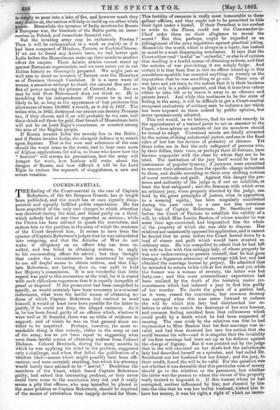THE AFG1T A N DEMAND T HERE is always something unpleasant
occurring in India. Now, it is a regiment which had mutinied, and then a conspiracy which has been discovered in a dependent state, now the peasantry combine to refuse their rents, and then the Government doubles the import duties. But, of all news irritating to Governments and ominous to tax-payers, commend us to the phrase "the Persians have occupied Herat." Its first appearance involved three campaigns, the loss of a great army, a serious shock to our reputation, and ten years of Indian financial embarrassment. The second produced an invasion of Persia, a bill of some millions ster- ling, and a divergence of our European strength, which was one among many causes of the mutiny we have but just sup- pressed. And now here it comes for the third time, and telegrams in the old succession inform us that the Persians are marching on Herat, have taken Herat, and are invading Candahar. Worse than all, the Afghans "have applied to the British for aid." The application, backed as it is quite certain to be by every officer in the Punjab, will throw India into a flutter of joyful expectation. People are so tired there of the monotony of their daily lives, that they would almost welcome an earthquake, while the largest section of society, the army and its dependents, will be all agape for work, distinction, and service pay. The Indian Government will be subjected to a pressure such as an outrage produces in England, its -traditions are all in favour of interference, Lord Elgin is new to power, and we may in a week or two find that Post Mahommed is to be subsidized, an expedition sent into Candahar, or the army along the frontier raised to double its necessary strength. We would not move a man, or waste one single rupee, upon any Afghan alive. There never was, in the his- tory of the British Empire, a delusion so irrational as that which produced the Afghan and Persian wars, which induced us in 1857 to subsidize Boat Mahommed — though, as it happened, the last money was well spent, and kept him from attacking Peshiwur—and which has for thirty years loaded the Indian Treasury with precautionary expenditure. That delusion was based upon the following theory. Persia pushes towards India only at Russian insti- gation, and should she occupy Candahar the Czar will be posted at our gates. We say nothing of the many questions which the alarmists beg, the impossibility of keeping down the Afghans without a great army for which the Shah has no revenue, and which his conquered province cannot support, of the hatred borne in Ispahan to St. Petersburg, or the doubts whether Russia will care for the next generation to spread her- self to the South. We will admit everything Mr. Urquhart could urge, will allow that the Persian frontier may be pushed to the mountains which guard our own, and will concede that she advances only to gratify her dangerous Northern ally. And granting all that, or a great deal more than the truth, we ask what then? The Russian Government has then at the utmost the means of pushing an army in tolerable array up to the frontier of Scinde, but what is it to do when It gets there ? The country itself is not worth having, and an invasion of India from the north is one of those enterprises which look possible only upon a map. The army which enters British ter- ritory, whatever its size, must as its first step break with its communications. All the resources of Russia and Persia com- bined could not provide commissariat and modern artillery for fifty thousand men, with six hundred miles of desert and mountain between themselves and their nearest possible base. In front of them stands an empire of two hundred millions of men, and a Government organized for battle, with a regular army of seventy thousand Europeans, and the ability to ex- pend one native regiment a day for twelve months without reaching the limit of the soldiery trained under its own standard. Are fifty thousand Russians so dreadful that we must assume as a certainty that they will conquer a force seven times as great as their own ? But the Sikhs might revolt ? Of course they might, and so they may now, but any man who imagines that the Sikhs intend to conquer India for any people but themselves, misunderstands the race,. As a matter of fact, they, like all other Hindoos, dread the Russians, of whom they know nothing, and detest the Per, sians, of whom they know that Nadir Shah massacred the people of Delhi. Without native assistance to invade India y to pour into a lake of fire, and however much they alike us, the natives will help to buildup no other white r. Meanwhile the invasion of India involves for Russia opean war, the blockade of the Baltic ports, an insur- rection in Poland, and immediate financial ruin.
But the invading army may be exclusively Persian ? Then it will be extinguished in a week as readily as if it had been composed of Hindoos, Tartars, or Cochin-Chinese. If we are to dread any Asiatic force, we had better quit India before the Mussulmans make up their minds to another effort for empire. These Asiatic armies cannot stand up against European organization, and we were never yet in our Indian history so thoroughly prepared. We might just as well arm to resist an invasion of Tartars over the Himalaya as of Persians through Candahar. It is a mere waste of means, a senseless attempt to check the natural flux and re- flux of power among the princes of Central Asia. But we may be told Dost Mahomnied does not think so. He is trembling for his independence. Of course he is, and is likely to be, so long as the appearance of fear produces him allowances of some 10,0001. a month, as it did in 1857. The tribes who, in 1842, destroyed our armies can destroy Persians too, if they choose, and if, as will probably be the case, half their chiefs sell them for gold, that breach of Mussulman faith will not be on Lord Elgin's conscience, or counted among the sins of the English people.
If Russia invades India the remedy lies in the Baltic ; and if Persia invades India, the cheapest defence is to march upon Ispahan. That is the sum and substance of the case should the worst come to the worst, and to hear once more of Afghan applications for aid is, to those who know how the "frontier" will scream for precautions, how the army will hunger for work, how Indians will write about the designs of Russia, and how difficult it will be for Lord Elgin to endure the reproach of sluggishness, a new and severe vexation.































 Previous page
Previous page